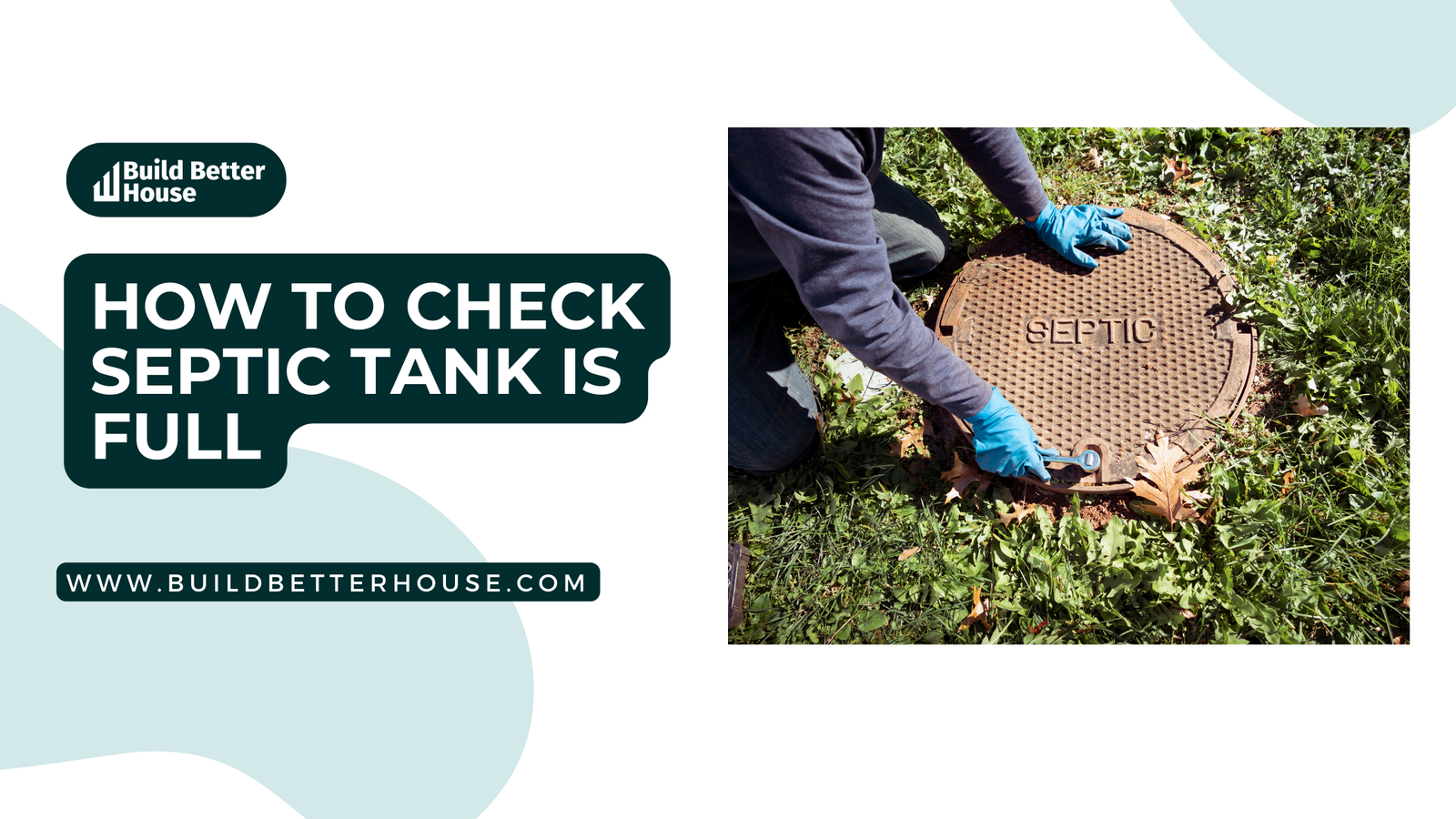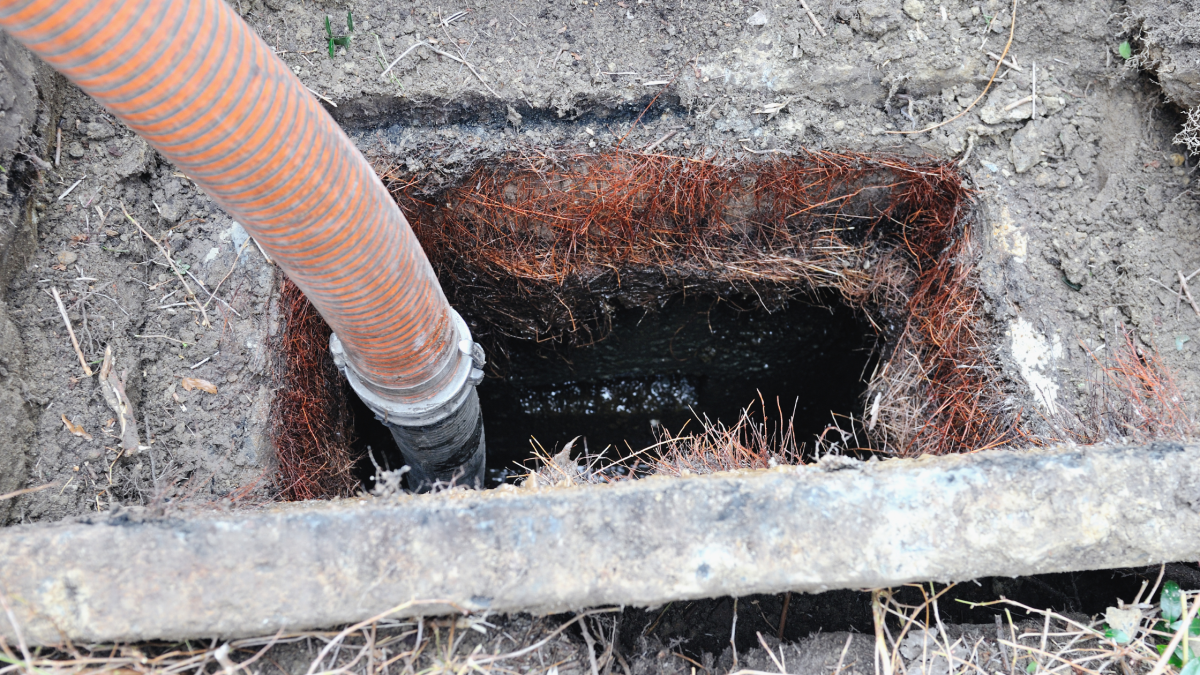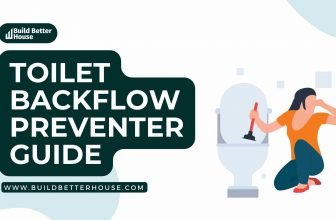How to Check Septic Tank is Full: Expert Tips for Proper Maintenance

A septic tank is an essential part of many homes, providing an efficient wastewater solution that contributes to a more self-sufficient lifestyle. However, like any other system in your home, septic tanks require regular maintenance and attention. One critical aspect of this maintenance is knowing when your septic tank is full, as this can help you avoid potential problems and ensure the continued efficient operation of your system.
Identifying a full septic tank can be tricky, especially for those who are new to this type of system. A few common warning signs can help you determine when your tank might be reaching its maximum capacity. Slow drains, for example, can indicate a full or clogged tank. Furthermore, if you notice a septic pump running more frequently than usual, it could be a sign that the holding tank is full. Proper inspection and troubleshooting of your septic system can provide valuable insight into whether it’s time to take action.

Key Takeaways
- Regular maintenance of your septic tank, including checking its fullness, is crucial for efficient operation
- Monitoring warning signs, such as slow drains and frequent pump operation, can indicate a full tank
- Proper inspection and troubleshooting help to identify and address potential septic tank issues
Identifying a Full Septic Tank
Signs and Symptoms
Understanding the signs and symptoms of a full septic tank can help you address any issues promptly. It may be time to act if you notice the following:
- Slow drains and gurgling sounds
- Pooling water and a green lawn around the drain field
- Sewage backup and bad odors in your home
Slow Drains and Gurgling Sounds
One of the first signs of a full septic tank is slow draining water from your sinks and toilets. When your septic system is functioning properly, wastewater should flow smoothly through the drains and pipes. However, blockages can cause waste to accumulate and slow down your drains. You may also hear gurgling sounds in your pipes, indicating that it might be time for professional septic tank maintenance or pumping.
Pooling Water and Green Lawn
A full septic tank can lead to the pooling of water and fertilized grass around your drain field. When the tank is full, solid waste may block the outlet pipe, causing wastewater to overflow. This overflow can result in pools of water on your property and a greener lawn than normal due to the excess fertilization from wastewater. If you notice these signs, consider contacting a professional to inspect your septic system.
Sewage Backup and Bad Odors
Perhaps the most serious indication of a full septic tank is sewage backup and bad odors coming from your drains. When your tank is full, excess wastewater and sludge cannot be properly treated and may cause sewage to back up into your home. This backup can lead to unpleasant smells, harmful bacteria, and potential damage to your house’s fixtures. Avoid DIY attempts to remedy the situation and instead call a septic system professional to assess and resolve the issue.
Remember, regular maintenance and proper septic treatment can help prevent these issues and prolong the life of your septic tank system. Being aware of the signs and symptoms, and acting promptly when necessary, can save you time and money in the long run.
Preventative Measures and Maintenance
In order to keep your septic system running smoothly and prevent issues, it’s essential to perform regular maintenance and follow some preventative measures. This section will cover routine pumping, proper use of toilets and drains, and environmentally friendly practices.
Routine Pumping
Regularly pumping your septic tank is crucial for maintaining its function and preventing problems like clogs, slow draining, and backups. According to the Environmental Protection Agency (EPA), your tank should be pumped if:
- The bottom of the scum layer is within six inches of the bottom of the outlet
- The top of the sludge layer is within 12 inches of the outlet
- Over 25% of the liquid depth is sludge and scum
It’s generally recommended to have your septic tank inspected by a professional at least every three years. They can determine when it’s time for pumping based on the specific conditions of your system.
Proper Use of Toilets and Drains
It’s essential to treat your toilets, sinks, and drains with care to avoid clogs and other issues within your septic system. Here are some tips:
- Only flush toilet paper and human waste down the toilet. Items like wet wipes, feminine products, and cotton swabs can cause clogs.
- Avoid pouring grease, fats, and oils down your drains, as they can build up and restrict the flow of waste in your septic system.
- Use enzyme-based septic tank treatments like Septic Treatment to help break down waste more effectively.
- Use environmentally friendly and septic-safe cleaning products, as harsh chemicals can kill the beneficial bacteria in your septic tank.
Environmentally Friendly Practices
Adopting environmentally friendly practices can help maintain your septic system and protect the environment. Here are some suggestions:
- Conserve water by fixing any leaky plumbing fixtures and using low-flow toilets and showerheads.
- Plant grass over your septic tank and drain field to prevent soil erosion and help absorb any effluent that may surface.
- Avoid constructing patios, driveways, or placing heavy objects on top of the septic tank or drain field, as they can damage your system.
- Keep trees and plants with deep roots away from your septic tank and drain field to prevent them from growing into your system and causing damage.
By following these preventative maintenance tips and taking care of your septic system, you can help extend its lifespan, avoid costly repairs, and keep it functioning properly. Remember that regular inspections by professionals are key to identifying potential issues early and ensuring your system is functioning as intended.
Tank Inspection and Troubleshooting
When to Call a Professional
You may be able to troubleshoot some septic tank issues independently, but certain signs indicate that it’s time to call a professional. If you notice bad odors near drains or sewage backup in your toilets or sinks, these problems suggest that the septic tank may be full or experiencing blockages. Furthermore, slow drains, weak flushing, or unusually lush vegetation over the drain field could also indicate a full tank or a leak. When these issues arise, it’s crucial to contact a plumber or septic tank professional to inspect and address the situation promptly.
Assessing the Septic System
To assess your septic system, it’s essential first to understand how it works. A septic tank receives waste from your home and separates solid waste from effluent. The solid waste sinks to the bottom, while the effluent flows out through the outlet pipe into the drain field or leach field for further treatment. Regular maintenance is necessary to ensure proper functioning and prevent septic tank problems.
Give particular attention to the following aspects of your septic system during inspection:
- Visual Inspection: Examine the area around the septic tank and leach field for any signs of leakage or overflow. Wet spots, greener grass, or foul odors could signal an issue.
- Check Outlet and Inlet Pipes: The proper flow of waste in and out of the septic tank is crucial for its effectiveness. Inspect the inlet and outlet pipes for blockages or damage.
- Maintenance Records: Keep track of all maintenance performed on your septic tank, such as pumping out solid waste or making necessary repairs. This information will help you identify trends and potential problems.
- Leach Field: The leach field is responsible for treating effluent. Examine the area for any signs of trouble, such as pooling water, excess vegetation, or foul smells, which may indicate a malfunctioning leach field.
By regularly assessing your septic system, you can identify issues early and ensure your plumbing system remains functional and efficient. Remember, if you encounter any problems that you’re unable to address yourself, don’t hesitate to contact a professional for assistance.
Septic Tank Treatment Options
Natural Enzyme Treatments
Using natural enzyme treatments for your septic tank is an environmentally friendly and effective method to maintain its functionality. These treatments are composed of beneficial bacteria and enzymes that help break down solid waste and decrease the risk of clogs or backups. You can easily apply natural enzyme treatments to your septic system by flushing them down your toilet or adding them directly to the tank.
There are various natural enzyme septic treatment options available on the market, and many can be found on websites like Amazon. Be sure to look for products with good reviews and follow the manufacturer’s instructions for use.
Commercial Septic Treatments
Commercial septic treatments offer a more powerful option for maintaining your septic system. These treatments often contain a concentrated blend of enzymes and bacteria, designed to rapidly break down waste and prevent buildup in your tank. Many professional plumbers recommend using commercial treatments as a preventative measure.
You can purchase commercial septic treatments at local hardware stores or online retailers like Amazon. When deciding on a commercial septic treatment, consider EPA-approved options for a product that complies with environmental protection standards.
To properly use commercial treatments, follow the tool’s guidelines and dosage instructions. In most cases, the treatment is added directly to the septic tank or flushed down a toilet in your home. Both DIY and professional approaches can be taken for using commercial septic treatments; however, consulting with a professional plumber or septic service provider is recommended for optimal results.
Frequently Asked Questions
What are the signs of a full septic tank?
A full septic tank can present various signs, including slow-draining fixtures, foul smells around the drain field, or gurgling noises coming from the plumbing. Additionally, wet patches on the ground or saturated landscape near the septic tank could indicate an overloaded tank.
How do I know if my septic tank needs pumping?
To determine if your septic tank needs pumping, you should have a septic professional inspect the tank’s scum and sludge layers. If the bottom of the scum layer is within six inches of the outlet or the top of the sludge layer is within 12 inches of the outlet, your tank may need to be pumped.
What to do if the septic tank is overflowing?
If your septic tank is overflowing, you should immediately contact a septic professional to address the problem. They will help determine the cause of the issue and perform the necessary repairs or pumping. In the meantime, avoid using water-intensive appliances and try to limit water usage.
How often should a septic tank be emptied?
The frequency of septic tank emptying depends on the size of your tank, the number of people in your household, and your water usage habits. Generally, most tanks need to be pumped every 3 to 5 years. Scheduling regular inspections will help you determine the optimal pumping frequency for your system.
What are the home remedies for a full septic tank?
While there are some home remedies that claim to help maintain a septic tank, such as adding yeast or septic additives, their effectiveness is debated. Instead, focus on regular maintenance and inspections by professionals to keep your septic system functioning optimally and avoid overloading it with excessive water usage or harmful chemicals.
Can heavy rain cause a septic tank to get full?
Heavy rain can lead to an increase in groundwater levels, resulting in a saturated drain field. This can temporarily cause your septic tank to appear full or overflow. It’s essential to wait for the groundwater to recede and avoid using water excessively during periods of heavy rainfall. If the situation persists, contact a septic professional to inspect and assess the issue.






